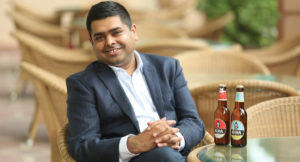Faasos was actually founded in 2003 and operated as a small business for a while. In 2011-2012, the company went through an organizational transition and faasos conceptualized the job title of entrepreneur-in-residence or eir, and it became a key element of its comeback strategy. At startup50, raghav joshi, one of its eirs, explains to us the role of an entrepreneur-in-residence
POORNIMA KAVLEKAR
For almost every entrepreneur, there is something personal that connects them with their startup idea. For Jaideep Barman, the founder of Faasos, it was his love for Kolkata and the street food from there, that led him to launch Brand Faasos, a company that would serve Kaati rolls and other nibbles, in a QSR format.
However, for almost 7 years, the business wouldn’t scale and Barman decided to bring about a transformation. One of his masterstrokes was to focus on rejigging the organizational structure and roping in entrepreneur-professionals, people who’d have complete freedom to run Faasos’ outlets in a city or region. Since 2012, the company has scaled up rapidly. At the time of Startup50, Faasos was operating 130 outlets in 10 cities, serving 10,000 customers every single day. The company raised a series-A round from Sequoia in 2012 and a US $20 million Series-B from Lightbox Ventures and Innoven Capital earlier this year. Its goal: serve all four meals, within minutes, through neighbourhood delivery centres.
Here, we requested Raghav Joshi, an EIR who joined Faasos three years back, to explain what his designation means, his day to day role and how it contributed to the turnaround and growth of Faasos.
The job title
“Many people have asked me if I work from home? I say, I work from everywhere,” says Joshi, on a lighter note, while talking about what his job title means.
Joshi moves on. He reads for us the definition from Wikipedia: It says “Entrepreneur in Residence is a position, in a Venture Capital firm, Law firm or Business School that is usually temporary and not formal. This is when an institution brings in an entrepreneur, who is usually in the process of starting or expanding his/her new company.”
Still in tongue-in-cheek mode, Joshi confirms the following for us:
One: Faasos is not a VC firm, not a law firm and not a business school. Duh!
Two: He confirms for us that he has a permanent job.
Three: Joshi was a salaried management consultant before joining Faasos, so he was by no means an entrepreneur in the past.
Four: He was just joining Faasos as an employee.
“So as per the conventional definition, I did not fit in. So it sounded scary at the time of joining,” recalls Joshi. In 2012, there were six such EIRs hired, each handling different roles.
The question is why did Jaideep not go through the conventional route of hiring people who have ‘been there and done that’ rather than hire people who have been in different jobs, nowhere related to the food industry.
The early stages
During the early days, Jaideep hired people from the food industry especially those with culinary experience. However, from 2003 till 2010, Faasos did not grow much – in those 8 years it grew from one to 8 outlets. “This is mainly because Jaideep and the initial cofounding team were not aligned on a lot of things. In 2011, he looked for people who had a similar background as him so that it is easier to converse with them,” narrates Joshi. Joshi is an engineer, an MBA and a former management consultant, much like Jaideep. The founder’s philosophy was to get a team together that can understand each other and be able to brainstorm ideas. “Conventional wisdom is that you hire people with complimentary skill sets. We actually went against that and hired people who are similar in terms of their backgrounds,” states Joshi.
Once the team was in place, various issues that Faasos was facing was distributed among the team members. As a result, in 2012, Joshi shifted base to Bengaluru to set up operations in the city. “We have expanded to about 50 outlets in last two and half years in Bengaluru, Chennai and Hyderabad,” says Joshi.
Taking responsibility
What were these EIRs at FAASOS asked to do? Practically everything – handling different functions, cities, firefighting issues and so on. “Ankur Sharma, who was earlier a HR consultant in Infosys, came on board. He was asked to handle the supply chain function. Background really does not matter. The whole idea behind our role was to see if we had the attitude and willingness to learn things. Eventually, we had it figured out,” recalls Joshi.
Joshi joined in October 2012 and soon after he joined he was asked to get ERP systems on board. The fact was that he didn’t know anything about ERP but he learnt a lot on the job by interacting with vendors and within 2 months was able to do the needful.
After this stint, he moved to Bangalore where he had to expand the business quickly. “The first task was to find an outlet in Bengaluru’s Jyoti Nivas college road,” says he. And a chance meeting led him to the right real estate space. “The reality is – I just figured things out and made it work. It has been a learning journey out and out,” says Joshi.
So going back to the original definition of the role of an EIR, Joshi says it is really not incorrect. He justifies how:
“One: Faasos is not a VC firm, not a law firm and not a business school. Well, maybe not. It is a startup but it has been the best business school for me.”
“Two: As an EIR, you take ownership of a problem at hand and solve it. It could be setting up ERP systems, finding real estate or growing to 50 outlets. So, nothing is permanent.”
“Three: Yes, I was not an entrepreneur before. But today, the things I do at Faasos are all entrepreneurial.”
“Four: I own the geography I am responsible for and my task is to behave like an entrepreneur.”
With this reshuffling within the organisation, it has grown at fast clip. From 2011 to 2014, the company expanded from eight to around 40 outlets. In the last one year, it has expanded to 130 outlets. “We will be expanding one outlet a day. That is the kind of speed we achieve with the foundation that we have set in place,” says Joshi.
So far, the EIRs have been central to the scaling up journey of Faasos. The concept of an EIR, may just see far greater adoption.
KEY TAKEWAYS
Find the people who fit into the culture of your organisation, people who you can really trust.





